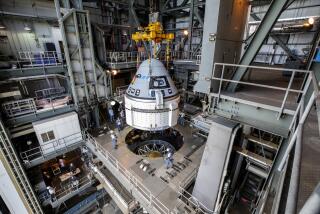Astronauts Say They Were Not Told of Rocket Concern
JOHNSON SPACE CENTER, Houston — NASA’s astronauts were not informed that engineers had been concerned for more than two years about the safety of the space shuttles’ solid-fuel rocket boosters, four veteran shuttle commanders said today.
Henry Hartsfield, one of four astronauts who broke a month-long silence to talk to reporters, said he learned about a potential hazard involving gaskets that seal joints on the boosters only after the shuttle Challenger exploded Jan. 28.
“I was angry about it. Still am,” he said.
Hartsfield, Vance Brand, Gordon Fullerton and Joe Engle said they were never made aware of all the many parts of the shuttle that are called “criticality 1,” parts whose failure would mean a catastrophic loss.
The space agency allowed the four astronauts to be interviewed at Johnson Space Center.
‘An Implied Trust’
Fullerton said the astronauts didn’t have time to examine each system aboard the complex shuttles and “there’s an implied trust (in the engineers) in flying on the shuttle.”
All four said astronaut morale was high and that they would fly again once the cause of Challenger’s loss is found and fixed. “I’d like to be the first guy to take it up again,” Brand said.
None of the four would agree that there was a flaw in NASA’s launch decision process, as has been charged by the presidential commission investigating Challenger’s explosion.
Hartsfield said he felt such a decision was premature, but that he was concerned about reports that critical engineering questions about the boosters never reached the top levels of the National Aeronautics and Space Administration.
“If it did happen that way, I am troubled,” he said.
Brand said he believes the astronaut corps “should have been advised” about the engineers’ concerns about the boosters. “Normally we are informed about such safety issues,” he said. “It was an oversight that none of us know about this.”
More to Read
Sign up for Essential California
The most important California stories and recommendations in your inbox every morning.
You may occasionally receive promotional content from the Los Angeles Times.










